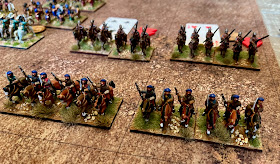The latest in my Nigel Tranter project also covers the rule of Mary Queen of Scots. However, this is one of Tranter's earlier novels (1953) that covers a specific part of the period: the conflict with the Gordons in northeast Scotland.
The story is told through the eyes of a minor Gordon laird, Patrick MacRuary Gordon, Laird of Balruary in Glen Livet. Glen Livet is a scenic spot to this day, although it is probably better known for Glenlivet whisky. The Gordons are a predominately Catholic clan led by the Earl of Huntly (Cock o' the North). Still, Patrick's father was a noted protestant, making him a suitable go-between with the Queen and the Protestant Lords of the Congregation led by her half-brother James Stewart, Earl of Mar. Called 'The Bastard' by just about everyone.
 |
| Glen Livet |
The Protestant Lords were spoiling for a fight with the Gordons, who were generally willing to oblige. James Stewart was also anxious to secure his Earldom of Moray, which abuts the Gordon territories. The Gordons were a strange mix of Highland and Lowland, creating division compounded by differences in strategy between the two sons. Mary was also in a difficult position as a Catholic Queen who would generally have looked to the Gordons for support.
Moray brings a large lowland army north on a royal progress to Aberdeen and Inverness. Patrick gains the Queen's confidence and gets involved in all the main events. This all ends badly at the Battle of Corrichie, fought on the slopes of the Hill of Fare in Aberdeenshire on 28 October 1562. Clan Chattan abandoned Huntly, and the new-fangled pike and shot tactics defeated the Gordon charge. Huntly died of a heart attack on the battlefield, and his son John was captured and executed. The older son was not at the battle and was spared by Mary's intervention, and she later restored his titles. The Gordon story lived on, and they will play an important part in future events.
 |
| Gordon Horse, of a slightly later period |



Thanks for the history lesson. It was more than we were taught at school (the only mention of things Scottish was where it impinged on the English. To be fair, we didn’t learn much about English history either - concentrating on the Industrial Revolution for some reason 😉).
ReplyDeleteCheers,
Geoff
Other than she got her head chopped off by Elizabeth, I doubt many Scottish school kids could tell you much more!
Delete